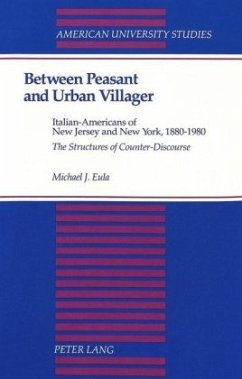Between Peasant and Urban Villager is a cultural history of the Italian-American working class in New Jersey and New York. It is a demonstration of how the cultural realm functions as an arena of class conflict on the plane of everyday life. It is also a study of cultural discourses - Roman Catholicism, funerals, adolescence - and the rhetoric of daily life which, through the 1980s, always assumed a boundary of equally compelling, yet contrary cultural expressions which many have called the dominant culture. The discourse of the area's Anglo-American middle class, like that of Italian-American workers, has historically functioned to define an interior sense of togetherness along with an outward perception of otherness.
"Michael Eula's book skillfully deploys Gramsci's theory to illuminate how Italian peasant culture persisted in America, how it affirmed working class identity, and how at the same time it was politically debilitating. This is a genuinely original work of cultural history." (Jon Wiener, University of California, Irvine)
"Eula's excellent book demonstrates why the Italian immigrant experience in America defies two prevalent schools of thought: assimilationists emphasize adaptation to dominant liberal values of individualism and opportunity, and transformationists see a radical challenge to such values as opposing capitalism. Instead, the Italians of New Jersey and New York strove to maintain their identity by leading lives of cultural continuity with the more organic, conservative traditions of the old country. A provocative work of research and narration dealing with a poignant chapter in American social history." (John Patrick Diggins, The City University of New York)
"Eula's excellent book demonstrates why the Italian immigrant experience in America defies two prevalent schools of thought: assimilationists emphasize adaptation to dominant liberal values of individualism and opportunity, and transformationists see a radical challenge to such values as opposing capitalism. Instead, the Italians of New Jersey and New York strove to maintain their identity by leading lives of cultural continuity with the more organic, conservative traditions of the old country. A provocative work of research and narration dealing with a poignant chapter in American social history." (John Patrick Diggins, The City University of New York)
